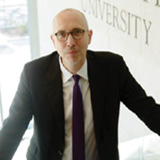Letter From the Dean: The Noble Nobel
 Academics are quite adept at granting ourselves awards. This practice has a long history, one that involves medals, prestige and rituals. It is, however, extraordinary when the rest of the world notices such matters.
Academics are quite adept at granting ourselves awards. This practice has a long history, one that involves medals, prestige and rituals. It is, however, extraordinary when the rest of the world notices such matters.
When Weinberg College Professor Sir Fraser Stoddart was awarded the Nobel Prize for Chemistry on Oct. 5, the world noticed. Articles in the New York Times, the Washington Post, the Wall Street Journal and other outlets noted the honor and celebrated the work of Sir Fraser and his co-laureates. The light shining on the College and Northwestern was bright. And what did it illuminate?
Two themes in particular, as emphasized by Stoddart: fundamental science and diversity.
Stoddart’s work on nano-scale “motors” is eminently transferrable to new technologies, but it emerged from his work in fundamental science. We at the College welcome the applications that may result from our research enterprise, but that is not the reason we invest in research. In the natural sciences, we are committed to supporting fundamental science — the exploration of knowledge for its own sake. This may seem quaint in a world driven by results, but as any scientist worth her salt will tell you, experimentation with too firm an idea of the desired results often leads to bad science. We are the stewards of fundamental science, and, while such work may appear in the short run to have little to do with applications, in the long run it is the very best investment in the future. Only by supporting a rich diversity of practices in fundamental science today will we ensure that the future is filled with discovery.
The diversity that yields such breakthroughs, as Professor Stoddart has so eloquently put it, is not only academic in nature. A born Scot, Stoddart works around the world and invites into his laboratory researchers from a stunning array of countries. Why? Because he is convinced that diversity — in thought, discipline and culture — leads to the best results. I could not agree more. Diversity is one of our central tenets at the College, and we understand this to be an ethical as well as a practical matter.
These emphases — on fundamental science and on diversity — mark Sir Fraser’s Nobel Prize as a particularly noble one.
Adrian Randolph
Dean, Weinberg College of Arts and Sciences